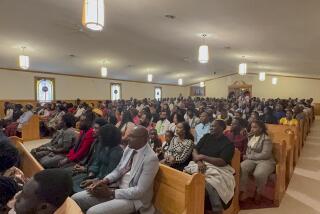IMMIGRATION : Fleeing Haitians Failing to Find a U.S. Advocacy : Few voices among groups who once escaped oppression are raised in refugees’ behalf.
Advocates for Haitians fleeing the military dictatorship in their homeland in crowded, leaking boats would seem to have a natural political constituency for gaining the refugees admission to the United States.
For many African-Americans, Haitians represent their distant cousins, the two nationalities joined together by a history of slavery. For Jewish Americans, the saga of the Haitians has a familiar ring: In 1939, 900 European Jews fleeing Nazi Germany aboard a ship were intercepted by the U.S. Coast Guard off Florida and returned to Europe, where most of them eventually perished in Nazi concentration camps. For thousands of recent immigrants, the Haitian story is strikingly similar to their own.
But few voices are being raised for the Haitians. The Bush Administration is now interning refugees at camps at the base in Guantanamo Bay, Cuba, awaiting a court ruling today that may allow the government to begin forced repatriation proceedings.
“I’ve never seen a more clear-cut moral issue that people find so comfortable dismissing,” said Rep. Charles B. Rangel (D-N. Y.), who is pushing for temporary protective status for Haitians. “Morally, nobody (in Congress) challenges me. But everybody tries to come up with an excuse not to let these people into the country.”
The reasons, claim politicians, political analysts and activists, are a mix of race, economics, indifference, and a longstanding tilt in immigration policy against Haitians.
For more than a decade, the United States, under an agreement with then-dictator and U.S. ally Jean-Claude Duvalier, refused admission to Haitian refugees. The government maintained that they were economic refugees fleeing poverty instead of political refugees fleeing persecution, despite widespread reports of political oppression and violence.
Only 1.9% of the Haitians seeking asylum in America over the last seven years were admitted, compared to the average admission rate of 23.4% for those seeking political refuge.
After a military coup in September ousted Jean-Bertrand Aristide, the first democratically elected Haitian president in more than 30 years, the Bush Administration declared an economic embargo against Haiti and refused to recognize the new leaders.
But the Administration declined to revise its policy toward the refugees, arguing that opening the gates to political asylum would encourage thousands more to attempt the dangerous crossing, with many drownings likely.
Several leading proponents of temporary admission accuse the government of racial discrimination.
“We’ve allowed tens of thousands of Cubans, Nicaraguans, Chinese and others to stay in this country, but we refuse these people,” said Ira Kruzban, a Miami attorney who represents Haitian refugees. “The only difference is race. I can’t see any other explanation.”
Gary E. Rubin, director of national affairs for the American Jewish Committee, agreed.
“I don’t pretend to know the motivations of the Bush Administration, but (the Haitians) have been treated differently,” said Rubin, whose organization has denounced the policy. “The only thing that presents itself as a clear difference is race.”
That may be part of the reason the issue has not caught on with the electorate, said Rep. Lawrence J. (Larry) Smith (D-Fla.).
“The reality is that most people have been and continue to be Euro-fixed,” according to Smith. “They have ancestors from Europe.”
African-Americans have largely failed to get behind the Haitian refugee issue. While some black organizations, namely the Congressional Black Caucus, TransAfrica and the NAACP, have called vehemently for a reversal of the government’s policies, it has not been high on the agenda of many political and religious organizations.
“In our strategy meetings over the years, we have often said we need to do something about Haiti,” said a policy analyst for TransAfrica, a Washington D.C.-based organization which spearheaded the U.S. anti-apartheid movement. “But we can never come up with a good strategy. It’s messy because you’ve got a black government oppressing black people.”
And in the current economic climate, blacks and whites may be too concerned about their own domestic agenda to worry about the refugees. For many, particularly blacks in Florida, Haitians represent more cheap labor in a time when jobs are hard to find.
More to Read
Sign up for Essential California
The most important California stories and recommendations in your inbox every morning.
You may occasionally receive promotional content from the Los Angeles Times.










